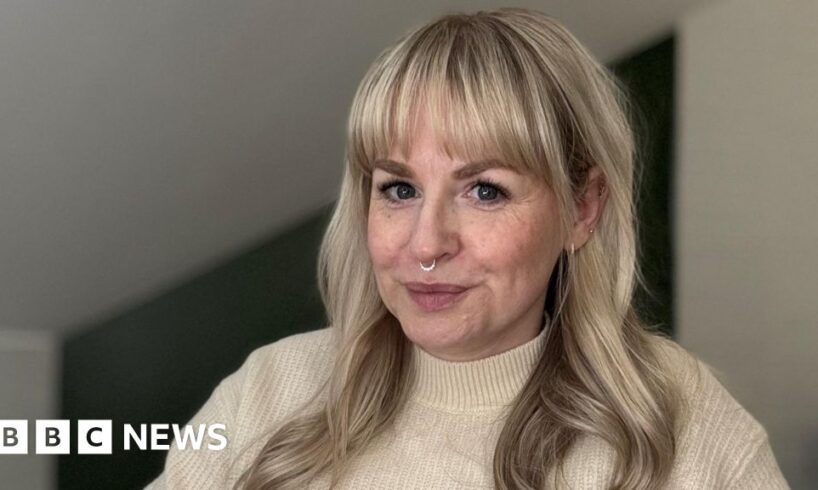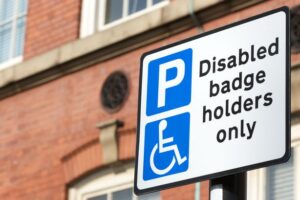
Katie Trodler
Katie has had to sit on a plane for over an hour before and wait for her wheelchair to arrive
Katie Trodler was due to fly home from Hamburg, Germany, when the assistance staff failed to turn up.
The plane was delayed for an hour while they waited, with the pilot telling the mum-of-one he would “physically carry” her on to the plane if the problem did not get fixed.
As a wheelchair user she said it was an “embarrassing” experience, but according to her and others is not a unique one.
“I’m not choosing this situation. I’m not a passenger that’s kicked off. I’m not drunk and disorderly. I just want to travel like everyone else on the plane and get home to see my kid and husband,” said Katie, from Holywell, Flintshire.
According to Welsh Paralympic gold medallist David Smith, the way people with a disability get on and off a plane, and the problems they experience, “hasn’t changed in the last 20 years”.
The Civil Aviation Authority, the UK’s aviation and aerospace regulator, said investment from airports and airlines had resulted in ”significant improvements” for disabled passengers and those with reduced mobility, but admitted there was “much more” to do.
Last week former Paralympian Baroness Tanni Grey-Thompson published a set of recommendations after leading a UK government-commissioned review looking at how airline and airport staff support disabled passengers.
Disability Rights UK has called for urgent action, and said disabled people have been made to feel like “second-class citizens”.
Katie has been a wheelchair user most of her life after a cancerous tumour damaged her spine when she was 10 months old.
She became a regular in the skies 15 years ago when she started a long-distance relationship and now frequently flies for work.
For the most part the flying process was “smooth”, she said, but when Covid hit, the 37-year-old noticed a difference in the service.
“Staffing levels are much lower. When I flew from Hamburg the assistance didn’t turn up and the plane got delayed by an hour,” Katie said.
“It was so embarrassing because everyone on the plane knew why their flight was delayed.”
The mother-of-one said she often felt like a burden when flying and that staff and passengers are not happy when there is a delay.
“I think it adds an extra layer. It’s already stressful worrying if your chair is going to be in one piece when you arrive and on top of that you feel like they hate you as a passenger.”
Katie added she has needed to “argue” her case to use her personal wheelchair when checking in at airports, as staff had previously insisted she use a porters chair without the correct support which had to be pushed by someone else.
She said: “Where’s the dignity? Where’s the autonomy?”
Karen Beattie
Karen worries about the condition her wheelchair is going to be in when she gets to her destination
Karen Beattie, 64, had a motorbike accident in 1994 leaving her with a spinal injury.
For many years she did not fly after hearing about the “hassle” of getting on and off a plane and the worry of equipment being broken.
She now tries to get abroad at least once a year, but dreads flying because she does not know what assistance she will receive from the airport and airline.
Karen, from Prestatyn, Denbighshire, said to get on to a plane she needs to use an aisle chair rather than her own manual chair, with staff helping by lifting under her arms and legs.
“They didn’t work together and didn’t lift me high enough causing the aisle chair to fall over,” she said, recalling one experience.
“They had to try and put me back on my chair and it was then that I was nearly dropped. I was concerned that I would have bruises and even a pressure sore.”
Another time, Karen said she was left “mortified” when a pilot blamed loading her wheelchair as the reason for a delayed take off.
“You’re just hoping that the ground could open up and swallow you because you become the spectacle, you become the entertainment before the fight takes off.
“I complain to the airport every year but there hasn’t been any improvements,” she said.
Claire Morrison
David is the most successful British boccia athlete winning five Paralympic medals
Paralympic gold medallist David Smith said the process for him to get on to a plane was “quite soul-destroying” and had not changed in the last 20 years.
“I don’t think we’ve made any progress,” said David, from Swansea, who has cerebral palsy.
“I find a lot of the assistance staff aren’t suitable for the job. People who can’t help with moving and handling where their job is to literally lift me from one point to another.”
Recently, David said he had noticed more care taken by the ground staff when handling his wheelchairs.
The 36-year-old said: “I think there’s less damage nowadays than there used to be back in the day. So that’s good.”
David added he understood some logistical problems cannot be helped, but said employing the right staff and providing the correct training could prevent bad experiences for future flyers with a disability.
In the findings led by Baroness Grey-Thompson, last week’s review said airline and airport staff were receiving “inconsistent” training, providing 19 recommendations, including disability awareness training being rolled out for all aviation roles, such as crew, ground services and hospitality.
Getty Images
Assistance staff help lift people with mobility needs on to a chair made to go along the aisle of a plane
A spokesperson for the UK Civil Aviation Authority said it “regularly” set standards on accessibility at the UK’s main airports and reported on how these are met, resulting in “significant improvements” for disabled passengers.
“We strongly believe that everyone should have access to air travel and expect all passengers from the UK to be able to enjoy the best possible flight,” they said.
The authority acknowledged “there is still much more to do” following Baroness Grey-Thompson’s report, adding: “We continue to hold airlines to account in meeting their obligations to disabled and less mobile passengers across all parts of their journey.”
Kamran Mallick, CEO of Disability Rights UK, said: “Flying is not a luxury. It’s a fundamental freedom that should be accessible to everyone. For too many disabled people air travel is marked by stress, anxiety, indignity and exclusion.
“Airlines, airports and regulators must recognise that disabled people have the right to fly with the same independence, safety and dignity as everyone else. Anything less is unacceptable.”





